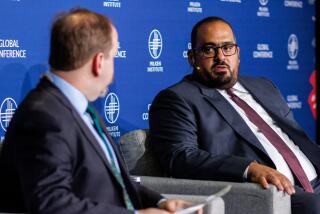Greasing the Wheels
- Share via
Two Southern California companies--Atlantic Richfield Co. of Los Angeles and Science Applications International Corp. of San Diego--are ground-floor participants in Venezuela’s multibillion-dollar effort to double its oil production over the next decade.
Arco is investing $1.5 billion in a new heavy-oil refining and transport system in eastern Venezuela’s Orinoco region, while SAIC is a 60% partner in a $1-billion joint venture with the state-owned oil monopoly Petroleos de Venezuela, or PDVSA, to develop an information management system.
The two mega-projects are just two examples of the deals that have been signed by U.S. and other foreign companies in Venezuela since 1996. That’s when the government declared an end to two decades of protectionism, saying it would join South America’s privatization push and smooth the way for foreign investment in state-owned businesses ranging from mining companies and hospitals to utilities and banks.
Venezuela isn’t at the point yet of selling off PDVSA. But the country is forming strategic alliances aimed at making PDVSA more efficient and ramping up its oil production--already the highest in the Western Hemisphere--to 6.5 million barrels a day by 2007 from the current 3.5 million, said John Maisto, the U.S. ambassador to Venezuela.
Venezuela provides the U.S. with 20% of its crude oil imports and 10% of all the oil it consumes. That’s more than Saudi Arabia, said Maisto, who last week spoke at a seminar at the Institute of the Americas on the UC San Diego campus.
Venezuela’s new openness is leading to a boom in the country’s imports, the value of which rose 22.5% to $6.4 billion during the first seven months of 1997. In 1996, California’s exports to Venezuela rose to $178.6 million, a 33% increase over the previous year. High technology and oil services and equipment were the leading categories.
But Maisto noted that investing in Venezuela is not risk-free. Memories of the country’s nationalization of several industries in the 1970s are still fresh.
Nearly two-thirds of all software used in the country today is pirated, Maisto said, so he is negotiating an investment treaty that would protect intellectual property, eliminate monetary controls and provide guarantees against future expropriations. He expects the pact to be signed sometime this year.
Just five years ago, the vast majority of U.S. companies exporting products to Latin America accepted only two forms of payment: cash on the barrel head or an irrevocable letter of credit. The concept of offering terms to faraway customers was indeed foreign.
But companies looking to boost exports are gradually coming around to a form of coverage called export credit insurance which, by ensuring they get paid for goods shipped halfway around the world, enables them to offer 30-to-180-day financing to foreign customers. And that is helping to increase trade overall.
Music Notes: Drum Workshop, an Oxnard maker of musical instruments, has seen its exports grow 30% over the last two years to now represent 35% of sales, due in large part to the practice of offering terms to overseas customers. Sales in Brazil have jumped 50% simply because Drum Workshop gives its Sao Paulo distributor 30 days to pay.
“It helps our distributors stock more of our products,” said Larry E. Winerman, Drum Workshop’s international sales manager. It is also a competitive issue: European and Japanese manufacturers use such insurance.
The California Department of Trade and Commerce expects to open its first South American office this year, either in Brazil or Argentina, to help boost the state’s exports to the continent’s 270 million people. The agency currently has 13 offices around the world, including Mexico City.
*
Chris Kraul can be reached by e-mail at chris.kraul@latimes.com
More to Read
Inside the business of entertainment
The Wide Shot brings you news, analysis and insights on everything from streaming wars to production — and what it all means for the future.
You may occasionally receive promotional content from the Los Angeles Times.










